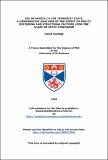The dynamics of the terrorist state : a comparative analysis of the effect of policy decisions and structural factors upon the shape of state terrorism
Abstract
This study employs Alexander George's 'structured, focused comparison'
methodology for small-N comparative analysis, in an attempt to address
some of the gaps in the theoretical literature on state terrorism. An
examination of that literature, both in the historical and social science
traditions, highlights various attempts to theorise about the processes by
which states attempt to influence the behaviour of their domestic
populations through violence. However, these have overwhelmingly
concentrated upon the question of why state terrorism occurs. The
question of how states terrorise has rarely been considered. This study,
then, is a heuristic evaluation of the process of terror after the decision to
initiate it has been taken.
It is suggested that solutions that will help to ameliorate the
human suffering and destabilisation caused by state terrorism are likely to
emerge from within the international community. However, in order for
the various governmental and non-governmental international
organisations to tackle the issue they must fully understand the dynamics
of terrorist states.
A definitional model of state terrorism is developed, building
upon existing concepts of state and sub-state violence. The model is then
used to identify appropriate cases for further examination. A number of
potential cases are highlighted, with Indonesia and East Timor (1975-1995)
and Guatemala (1978-1995) finally being selected. A research design is
formulated to examine the cases in the context of existing theory.
In conducting the case studies according the research design it is
postulated that while the initial impetus for state terrorism must come
from the regime, the most effective means of ensuring an efficient terror
campaign is to create semi-autonomous units with a direct overlap of
responsibility. These units are then allowed to innovate in their selection
of targets and tactics. It is noted that states are sensitive to pressure from
the international community, and will often respond by disbanding
offending units in an attempt to de-escalate violence. However, the
perpetrators of human rights violations are rarely punished. Impunity is
the engine of state terrorism.
It is concluded that the broader realist tradition of international
relations provides a revealing framework to assist our understanding of
how states react to extreme challenges to their domestic authority. It is
argued that in conducting wars against their own populations states
mimic the conditions of the international environment. Likewise, the
most powerful players in the international community (other states)
respond according to concerns of power politics. It is concluded that only
by providing independent international bodies to tackle impunity, such
as an International Criminal Court, can state terrorism be undermined.
Type
Thesis, PhD Doctor of Philosophy
Collections
Items in the St Andrews Research Repository are protected by copyright, with all rights reserved, unless otherwise indicated.

